On Thursday, LA Kings President/Alternate Governor Luc Robitaille, Chief Operating Officer/Alternate Governor Kelly Cheeseman and Head Coach Todd McLellan joined Television Play by Play Broadcaster Alex Faust for a round table discussion on the logistics being undertaken in an effort to return to play across the National Hockey League while keeping fans and arena workers safe. Robitaille and Cheeseman fielded questions about the Kings and Staples Center’s commitments to keeping fans safe and healthy, and McLellan also weighed in on competitive and personnel-related topics. A video of the Zoom call should be up early next week; a heavy portion of the questions solicited is below. Stay safe and healthy this weekend Insiders, and click here if you’d like to purchase Kings and L.A. sports paraphernalia while donating to the Mayor’s Fund for Los Angeles via the TEAMS FOR LA marketplace.
Alex Faust: I know a lot of the specifics are kind of up in the air, and like you said, you’re meeting, there’s a return to play committee with the players. Is there a push from teams like us to play out the regular season, or is there a format that you think the league has in mind of how to manage? Because we stopped with most of the season complete and a picture somewhat of which teams we know would make the playoffs, and we’re not in that category. So where do you stand on pushing the rest of the league to kind of say, ‘do we want to finish this, or not?’
Luc Robitaille: I think for us, if we had a chance to finish the season, we’d want to finish the season. Especially the fact that we have a lot of young players, it’s always a good experience for them to play. That being said, you keep hearing there might be a surge sometime in the fall. There’s a window on when we can call a little bit more calm that I think everyone’s looking at, that it might be a window where we would play. Because of that, we’re really not sure of where the league’s going to end up settling. Now, that being said, the NHL, unfortunately we’ve had a lot of work stoppage, and they kind of understand how much work it takes to get back and what needs to get done, and I fully trust the league that they’re going to do what’s best for us to come back, and that’s why Gary Bettman’s mentioned we don’t need to be first. It’s not a race to see who can. Let’s do it right. Let’s not do it where we come back, and then, oops, we’ve got to stop. He wants to make sure we protect the players, the people that we work around – people like you, Alex that would be calling the games and so forth. We want to make sure it’s done right if and when it’s done this summer.Kelly Cheeseman: I think on that note, the commissioner has been extremely thoughtful in his approach. We’re going to learn a lot from watching some of the other leagues go first. Even the Bundesliga in Germany is starting here pretty quickly and seeing how they’re going to operate. They’ve been very thoughtful going through that process and being detail-oriented and thinking about how they’re going to protect the players and everybody involved, and make sure that it’s meaningful when it does come out. To Luc’s point earlier, unfortunately, we have had two work stoppages, so that experience is something we’ve been able to lean on a little bit in terms of scenario planning and having a lot of confidence as a league and each individual organization.
* * * * *
Faust: When we get that going, Mayor Garcetti just [Thursday] was requiring everybody to wear facial coverings, no matter where you are. Our world’s going to be different before we get a vaccine here. Are there discussions going on right now of what Staples Center is going to be like for our fans when we can have them back in the building?
Cheeseman: Yeah, absolutely. And you hit on it – the Mayor, the Department of County Health are going to help work with every venue through that, but we’re being very thorough on that planning process now. (President of Staples Center, Microsoft Theater and L.A. Live) Lee Zeidman and his team are evaluating everything under the guidance of the CDC and the Department of County Health with all the various leagues. But everything’s getting evaluated, from points of entry and exit, how people enter the building, proper social distancing, seating areas, potential capacities, comfort for the fans, potentially looking at cashless venue, ticketless venue, evaluating all the serving areas, how condiments are distributed. All the high-touch points that need to be constantly cleaned. Ventilation and air cleansing with our atmosphere air system at Staples Center that we already have that helps kill various viruses and bacteria, and our BluEco system does the same thing there, so we’ve got a lot of redundancy. Additional technologies are going to be brought in for deep cleaning on a regular basis. At the end of the season, right before we shut down, we added restroom attendants to continue to clean the restrooms on a consistent basis. And so much more – there are so many new technologies on the table and all those things are going to be evaluated. As we always have been with Staples Center over the last 20 years, we want to be at the forefront of all that stuff, and we’ll continue to do that again, because we do know one of our biggest questions we have from season ticket members now is ‘what is going to be done to make it safe for us?’ You nailed it – the vaccine’s going to be the number one thing, but we’re a sports organization, we’re not going to be able to get the vaccine to you guys. But we’re going to make sure that our venue’s safe and we’ve got the best environment possible until that times comes.
* * * * *
Faust: Before we get to Todd, I just want to get a sense of how active we are able to be in the community right now. In KingsCare Foundation and a lot of Hockey Development stuff, it’s high-touch stuff. It’s all hockey, it’s being in groups. What are we able to do right now that allows us to still be active in the community and helping to grow the sport when we’re all locked and sheltered in place?
Cheeseman: So, I think there are two parts to that question. Right now, I don’t think it’s about growing the game of hockey in Los Angeles, it’s about supporting our community and the efforts that people need now, so the Kings Care organization – Jen Pope and Amanda [Apel] and their team – has done an amazing job going through some of these initiatives to support more monetary donations to the community. We had an event with SoCal Gas [Thursday] at LA Family Housing to donate some clothing product as well as hygiene products to homeless and L.A. Family Housing. I think those are the most critical things we can do right now. Our players have done … hockey drill programs, and more of that stuff is coming out here over the next couple months, and that’s great for the youth hockey community and will continue to do that. But much like Staples Center and coming back to play, all the rinks and youth sports organizations for that matter are going to go through a similar process to get back to it. Yeah, we’re going to adapt and evolve as the situation unfolds here, but I think the most critical thing is being here for the community needs as they are right now.
* * * * *
Faust: A lot of the questions we’ve gotten have been on the hockey side. I don’t know about you, but I keep thinking about where we paused when we were on a seven-game win streak. How much communication have you had with the players since we’ve stopped here? What have you been communicating with them? I’m sure there’s only so much hockey talk to go around. I wonder what you guys have been able to talk about.
Todd McLellan: Well, actually, the communication, like anything, is much different now than it was when we were playing on a daily basis. You got to see them and you could see their fatigue level, their emotional level, whether they wanted to communicate or not. Now, it’s done the same way. We’re doing it the same way right now, via Zoom, phone calls, texts, whatever it might be. So, it’s distance communication, but I think the players are receiving even more communication now than they have in the past. If you look at the different entities that are involved with it, and there’s the NHL right now directly, there’s the NHLPA, there’s committees that have been formed to keep them informed. I know Rob Blake and I have been on different calls with them to keep them up to date. Their agents are giving them feedback on what might be happening and what they do to prepare, and then more importantly, what are we doing as an organization? We have different individuals in different areas that are in contact with the players at all points. The assistants coaches have different roles and take care of different areas. They’ve been in touch with the players. I’ve spoken to numerous players or texted with them, ran into a couple in my walks here in the South Bay. Most of it is just checking in with them to make sure they’re healthy, that their families are OK and that they’re safe. Over and above that, we’re sharing any information we get from the NHL upper management, Kelly, Luc and Rob. The trainers are daily communicating with each of them, getting wellness checks. Our physical trainers are interested in temperature change and everything else that goes on in real life – forget the virus itself, but in real life – and the players report daily to our training staff, and the fitness people that we have involved with our organization have done a really good job. We have two programs going right now. One is a program where we’ll continue to play, and they have to maintain a certain level of fitness, but we’re trying to blend it right now with a potential summer program, which is really unique for this time of year. Normally the players themselves take a good chunk of time off and let their bodies rest and then get into some heavy lifting and strength building. Well, they’ve got to maintain what they had in the past and be prepared to go. So, kudos to everybody involved in our organization for communicating with the players, but I think the call they’re all waiting for is ‘when’s this going to be over, and what are we going to do,’ and we can’t make that call yet.* * * * *
Faust: Susan had one more for you, Todd. Are you in favor of this idea of a June draft? And, regardless of that, how active are you in communicating with the front office right now on trying to figure out our draft choices going forward?
McLellan: Well, as far as being in favor of it, it’s a tough time for everybody. There’s a large chunk of our league, we have great leaders, and they may see a need for it and a want for it for a number of different reasons that maybe haven’t even been discussed publicly yet. As far as our team goes, we’re preparing for both scenarios. Luc, Rob and the rest of the staff, as Lucky has mentioned, they’ve done a really good job in preparing for the short term, and that may mean an early June draft, or for the long term, and that could push it back later than when it normally is scheduled. In any case, we’ll be prepared. Rob and his staff have asked some of the coaches to be involved. At a small level, I think it’s dangerous when we cross lines and watch individuals on video for two or three games and then make really strong opinions. We answer questions when we’re asked, we look at certain scenarios that they like us to look at, but then, quite frankly, we get out of the way. We let the experts do what they do. They’ve been watching these players for not only this year, but for the past few years. Our staff has done endless amounts of research on character control and leadership qualities, stuff that you can’t normally see on the ice. As coaches, sitting here in my office, watching 10 minutes or 20 minutes of video, we don’t get to partake in that. We answer questions and then we get out of the way, and we let them do their thing.
Robitaille: I think when you think about it, you almost feel for the kids that are being drafted. For them, they have to wait – whatever, the end of August or next September. That’s when you feel for them, because this is the one thing they’ve been waiting their whole life [for]. I think as an organization, too, our group has done such a good job helping the development of those young players. For us, if the draft is in June, I think we would have a jump on helping them further their career a little bit quicker. So, we’d like that, but as Todd says, we’re ready. If it goes further, we’ll probably have an advantage because we’ll be able to do things we’ve never done, and if it’s in June, our guys are ready.
* * * * *
Faust: Luc and Cheese, this is from Morgan. When the teams are back and they’re starting to practice, will fans be allowed in Toyota Sports Performance Center? With social distancing and masks, do we think this is going to be an open or closed thing to the public? I know we’re supposed to in theory get to this Phase II from the NHL at some point, but I guess the question is would fans be allowed in?
Cheeseman: I think short term, and the initial phases that rwe’re inight now, just getting back to finishing the season, the answer is no. I think that’s just going to be about where we’re at and protecting the players as they get back to training. This whole process, look, I’m not the Department of Health or the CDC, and I’m not going to give you guys [inaudible] answers here, but I think all this stuff is going to roll through in phases until we get back to the complete normal, and our goal would go back to exactly that stage where practices are open again. Whether fans are wearing a mask or not I think will be determined by the health codes at that time. In short term, I think it’s going to be needed to protect the players. We’re not even sure what phase within the Governor’s plan and the State of California’s plan in which Toyota Sports Performance Center is going to be open publicly again. So, that’s kind of where things currently stand, but it’ll take some time to get back. I think the commitment we’ll have, or our goal, will be to get back to that at some day, but it’s going to take some time, and … everybody’s going to need to have a little patience going through that.
* * * * *
Faust: Here’s one from John. So, he asks, ‘has there been any consideration given to playing games in other parts of the country if L.A continues to place restrictions on large public gatherings in the fall? I’m going to put my own twist and ask as well – have you guys gotten the sense that once we are through the summer, assuming all goes well, we will be playing games in Staples Center sometimes in the fall. Is that something that is out of the question already? Where do we stand on that?
Robitaille: I’ll get started, and maybe Cheese can add something. Like, right now, I think the perfect answer is ‘We don’t know,’ you know? But, that being said, once the leagues start the 20-21 season, there’s full intention to play in each of our home buildings. Now, will there be fans allowed, or limited amounts of fans? We really don’t know at this point, because like I said earlier, things seem to change every day or hourly. But I know the league is trying to prepare as best as they can do to play a full 82-game season next year. Now, will that start in September, October, November or December? I think it has plans that it could start any of those months and still play a full, 82-game schedule next year. We really don’t know how that’s going to work, but I can fully say I think it would be at Staples Center for our home games. Correct, Cheese? I mean, I don’t see that we would be playing somewhere else.
Cheeseman: Yeah, I agree. There’s been no discussion, in particular, around the 20-21 season playing in another market. We would plan to play completely in Los Angeles next year. That said, look, I think the commissioner has always said everything’s on the table all the way through this, but it’s always been a focus to make sure the 20-21 season goes unaffected. The scenarios are endless. I think we could all go down the rabbit hole for the next 45 minutes if we wanted to.
* * * * *
Faust: Cheese, Robert asks, ‘how is this affecting the planned renovations at Staples Center?’
Cheeseman: Yeah, good question, Robert. Everything unfortunately because of the timelines being completely uncertain and the accessibility to workers and based on the phases of where we’re at, all that had to get put on pause for now. Yeah, it’s one of the unfortunate outcomes of this whole thing, but we’re going to be on pause for probably at least a year for the time being, just because you can say you need a number of month to complete these renovations, and you can already see the rollover effect if the seasons aren’t starting until December of next year, the off-seasons are even shorter and compressed, so we’re going to have to wait it out before we’re able to relaunch it, but rest assured, we’re still committed to getting to that point. But it is going to be paused for a little bit of time, which is a big disappointment for us. But we’ll get there, we’ll get there.* * * * *
Faust: Maybe it hasn’t been answered at least clearly from the league yet, but I want to know, and this is from Erin, is there a clear set of guidelines and benchmarks that the league is working with right now to being able to bring guys back, or are they still in discussion about this?
Robitaille: I would say they’re still in discussion about it. I think they’re definitely waiting. And you’ve got to remember, they’re dealing with different provinces in Canada and different states. I’m not sure what their benchmark is, but they’re waiting to get the OK from the government, and they’re making sure that if they start practicing, you can do it in each state.
Cheeseman: Yeah, I would say they’ve worked very closely with all the teams, even understanding in each one of our local markets what the local governments are saying about access to our facilities and when that could happen. Organizing 31 as one is a bit challenging. It’s been well publicized – they’re working closely with the Return to Play committee on what those guidelines would be, and all the doctors across the league, as well as the league doctors, to set those guidelines. So, it’s getting close in terms of that Phase I, getting the guys back to the facilities. But it’s going to take some time to get it all organized, 31 as one.
* * * * *
Faust: All right, we’ve got about 10 more minutes here, and I want to get to as many questions as possible. Here’s one for Todd from Ellen. What’s your goal next year or a milestone you’re looking to set? I mean, every team wants to win the Cup, but what’s a milestone that you’re looking for from the group next year?
McLellan: Well, we’ve got to re-establish those standards again and hold them accountable, especially early in training camp. I think there are going to be some challenges for us. When you look at the timeframe between when we finish and when we potentially could start, assuming way not be involved in the playoff or restart, that’s a long time without hockey. As a coaching staff, we’re aware of that. We’re going to have to go back to the basics, we’re going to have to reaffirm the way we want to play, we’re going to have to make sure that the language and terminology is understood again, and we’re going to be dealing with a different type of classroom. We’re going to have some students in there that will get bored quick because they’ve gone through it, and we’ll have some brand new students we’re going to have to blend them together. So, we’re going to have to be aware of that, we’re going to have to keep players challenged. Perhaps training camp’s going to go by a little bit quicker than it did in the past, because of the condensed time, so we’re going to have to be prepared for that as well. But as far as team goals, we obviously want to build off what we had at the nd of the season, that momentum that we created. We talked about turning the corner. We’re becoming a younger team that’s trying to introduce more skill, so hopefully we see more of that in the lineup, which will lead to more offense. I thought we improved greatly defensively as the year went on. Our offensive numbers, we created chances but we didn’t have really good finish totals. That can come in the form of power play, forecheck, offensive zone play, so there are some goals and standards we’ll have to set there. And then it’ll be about individual development and where are certain players at? Players like Kopitar have been around. They still have things they need to work on, and some of the focus will be there, and a lot of the focus will be on the youth entering the organization and how can we adequately provide a good environment for them to continue to grow so as the future evolves they’ll be dominant players? That’s what it’s all about. They have the responsibility, we have a responsibility, and we’re going to blend it all together.
* * * * *
Faust: Kind of a serious one from Mike, and he apologizes if it’s been asked before. Let’s say we have a season ticket member who’s on the older side or maybe a little bit immune compromised, and they’re not as comfortable attending our games. Will they lose their priority or place in line if, let’s say, they opt out of attending next year, or something to that effect?Cheeseman: No, I mean, now is not that time to be that stringent on all those guidelines. We’re going to continue to be as flexible as we can. There’s not a perfect template we can write this point on all those cases, but those are all really good questions to have. I think anyone who’s been a Season Ticket Member with us for the last 50-plus years knows we’re always an organization that works individually with our fans and we’re not here, especially in this time, to be restricting anybody on policies with that, so we’ll work through that with people as we get to those points.
* * * * *
Faust: Here’s one for Todd from Cheryl. What’s the goalie plan for next year? I’ve had a couple questions about this. Who’s 1A, 1B, has this been sorted out? Is there going to be a tryout at training camp, basically, for the top job?
McLellan: Well, I don’t know if we’d call it a ‘tryout,’ but we expect both of them to come back and play extremely well. From the time that Cal came up, he was outstanding. He looked poised beyond his years and he really contributed to our success down the stretch – but I think that Quickie played a big factor in that. His game from Christmas on or even prior to that was outstanding. His numbers would reflect that from that time frame. He was confident, he instilled a belief in his team which was really important, and he was a really good leader for us. You don’t often talk about goaltenders providing leadership, but his work ethic, his commitment to the team and to getting it better was exceptional. It’s as good as I’ve seen as a goaltender during my time in the National Hockey League. So, we’re quite fortunate to have two quality goaltenders at opposite ends really of their career. Not that Quickie’s going anywhere soon – we think he’s really valuable – but Cal’s also entering. The way they work together and with Bill Ranford’s leadership, I think they’re both going to contribute next year. I don’t think any smart coach ever pigeonholes himself into saying, ‘hey, you know what, Cal’s going to play 41, and Quickie’s going to play 41.’ We want internal competition, we want them to push each other. And they’ll do that, they’ll both improve.

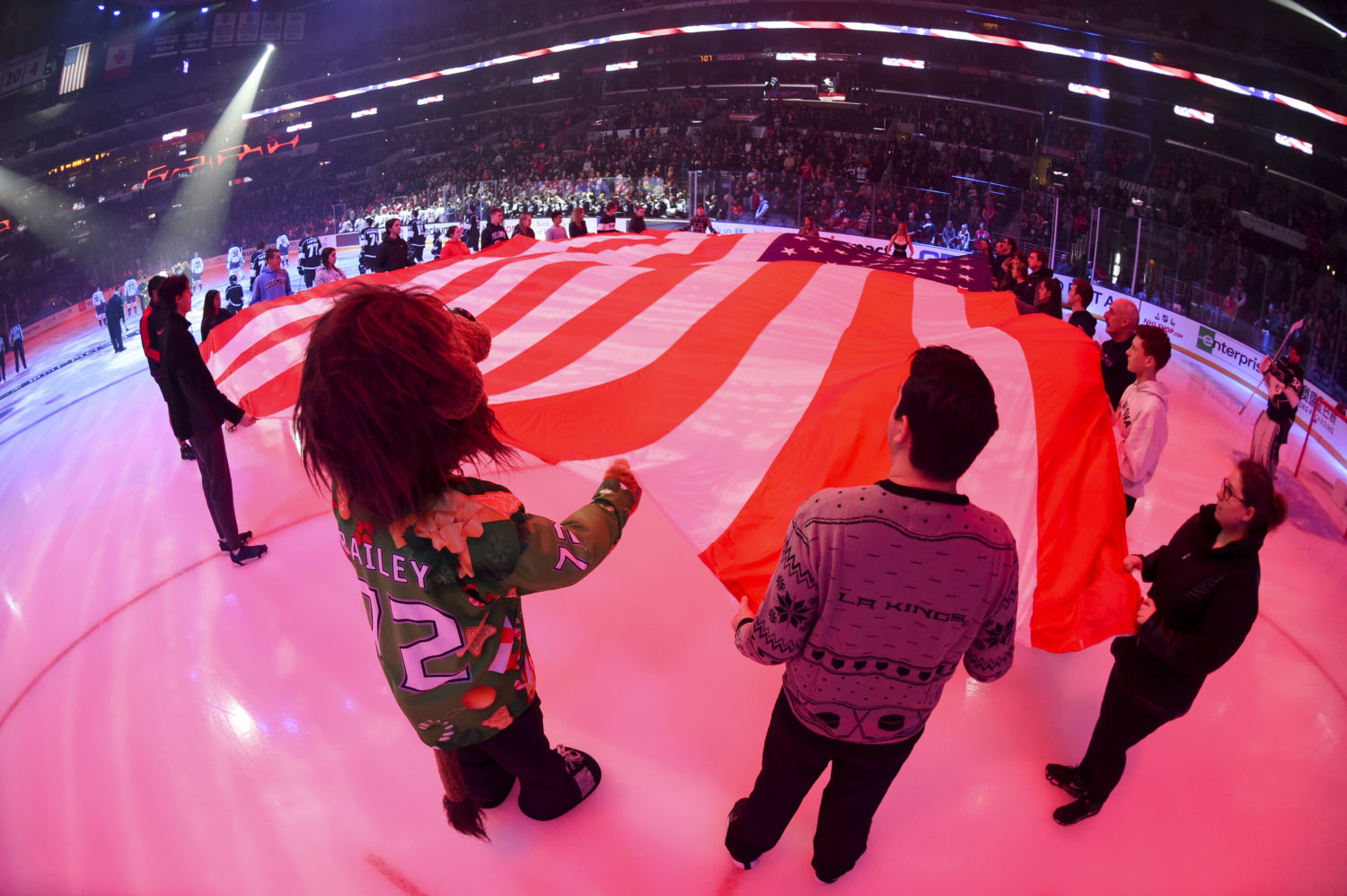
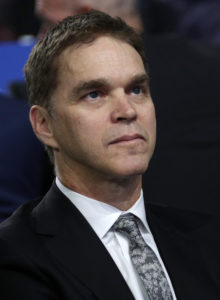
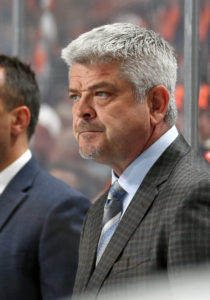
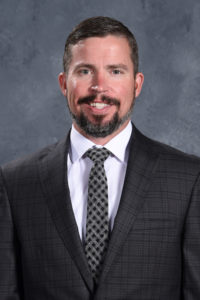
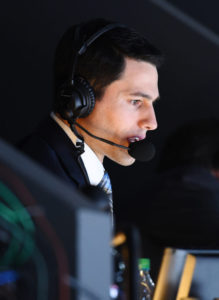
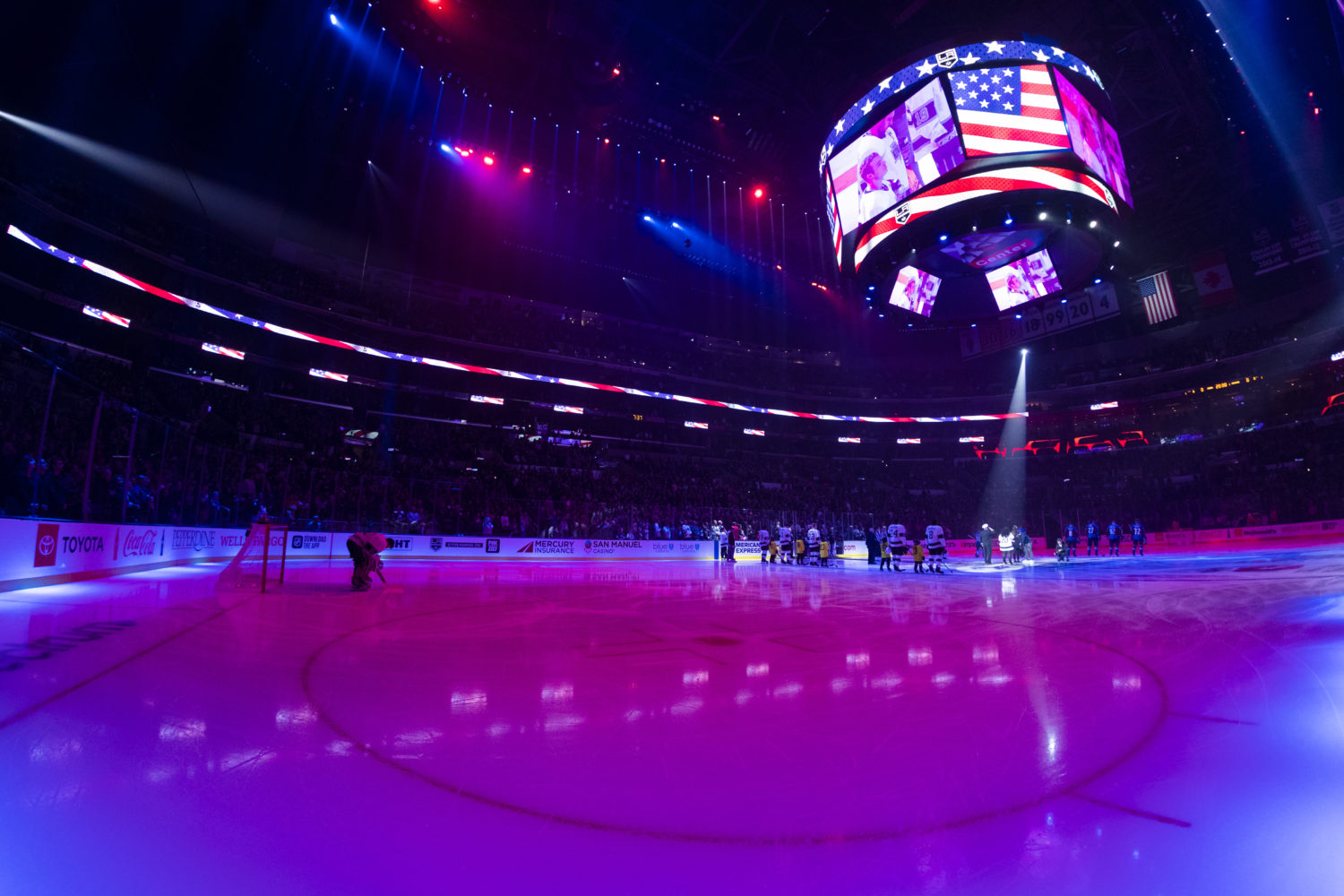
Rules for Blog Commenting
Repeated violations of the blog rules will result in site bans, commensurate with the nature and number of offenses.
Please flag any comments that violate the site rules for moderation. For immediate problems regarding problematic posts, please email zdooley@lakings.com.